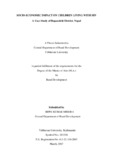Please use this identifier to cite or link to this item:
https://elibrary.tucl.edu.np/handle/123456789/2327| Title: | Socio-Economic Impact on Children Living With Hiv |
| Other Titles: | A Case Study of Rupandehi District, Nepal |
| Authors: | Mishra, Bipin Kumar |
| Keywords: | socio- economic;Socio-Security;Children |
| Issue Date: | Mar-2017 |
| Publisher: | Central Department of Rural Development |
| Abstract: | HIV, an immune deficiency virus is a viral disease which has no treatment till this date. In Nepal there are many reported cases of HIV infected people, the children being the vulnerable case since 1988. At the end of 2014, more than 39,000 people have been infected with HIV in Nepal with 0.2 percent infected young group. In Ruapandehi District more than 1000 people have been living with HIV and 88 children living with HIV. To know about the socio-economic impact on children living with HIV a study was carried out in Rupandehi District to analyze the status of Children living with HIV and the role of existing health facilities of concerned agencies. The main objective of the study is to find out the socio-economic impact on children living with HIV. This research tries to analyze the current status of Children living with HIV; analyze the socio-economic impact of social security fund on the life of the children living with HIV; analyze the role of existing health facilities of concerned agencies to strengthen and sustain their life to live a better life in upcoming days. Literature Review was conducted through various sources such as previous studies report, different articles about FMIS, previous thesis and internet to identify the gap. The research was conducted under descriptive and exploratory research design. Both primary and secondary information were collected during the course of study. Primary data were collected through structured questionnaire survey from the farmers. Key informant interview, field visit, observation and focus group discussion were also carried out while secondary data were collected from various published & unpublished information sources i.e. relevant literatures, books, journals, reports, annual reports and other official sources. In Rupandehi District, the children living with HIV are from different ethnic group and they have at least obtained primary level of education. In most of the cases, children living with HIV have been deprived from their biological parents care as most of children have lost their biological parents. 25 percentage Children Living with HIV have found lost their both biological, 37 percentage Children Living with HIV have found lost their father only and 14 percentage Children Living with HIV have found their mother only. Though 100 percentage Children living with HIV found having two times meal however 55 percentage Children living with HIV only found having nutritional balanced food in their day to day food. Children living with HIV.77 percentage Children living with HIV have enrolled in school and mostly have been found continuously attending school whereas 67 percentage Children living with HIV have found have rejoined school who once were school drop-out but because of several factors those drop-out Children living with HIV students again have found been enrolled in school. 83 percentage Children living with HIV have been found enrolled in Anti-Retro Viral therapy which improves health status of Children living with HIV from Lumbini Zonal Hospital in regular mode. Children living with HIV have not their health check-up in fixed routine however they have been found having their health check-up in need basis however 71 percentage children living with HIV found having regular health check-up from their nearest health post, district hospital, zonal hospital or community based health care or community care centre. 91 percentage Children living with HIV have got Cluster of differentiation (CD4) check-up whereas remained 9 percentage due to several reasons yet not found have got CD4 check-up. 83 percentage Children living with HIV agree on being some discriminated from society in community in different manners. 66 Children living with HIV have been got enrolled and receiving health facilities run and governed governmental agencies through different phases and different forums. Due to their HIV status Children living with HIV have been facing mixed behaviours from community person in their day to day life. High number of Children living with HIV found not having participated development activities exercised by government in different forums and have not got their equitable participation as well. All Children living with HIV have been enrolled in Children Affected By AIDS (CABA) Cash Transfer Program and are being benefited from program through monthly Rs.1000 cash support to them to have educational, nutritional and health support which have been found in different lives of Children living with HIV as CABA Cash Transfer program found have been supported to Children living with HIV to have school enrolment or re-join their school, to have ART start-up and continuity, CD4 check-up, regular health check-up, linkages in different types of health related services by government or social organization, provide regular counselling and positive way of living. Care and Support services in Rupandehi district have been found providing health services in home of each Children living with HIV in regular and need basis which has found beneficial for children living with HIV to enhance their quality of life living which has been clearly found in their day to day life. |
| URI: | http://elibrary.tucl.edu.np/handle/123456789/2327 |
| Appears in Collections: | Rural Development |
Items in DSpace are protected by copyright, with all rights reserved, unless otherwise indicated.

